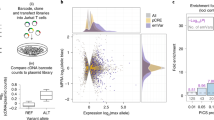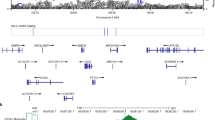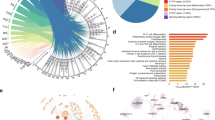Abstract
Genetic variants near the tumor necrosis factor-α-induced protein 3 gene (TNFAIP3) at the chromosomal region 6q23 demonstrated significant associations with multiple autoimmune diseases. The signals of associations have been explained to the TNFAIP3 gene, the most likely causal gene. In this study, we employed CRISPR/cas9 genome-editing tool to generate cell lines with deletions including a candidate causal variant, rs6927172, at 140 kb upstream of the TNFAIP3 gene. Interestingly, we observed alterations of multiple genes including IL-20RA encoding a subunit of the receptor for interleukin 20. Using Electrophoretic mobility shift assay (EMSA), Western blotting, and chromatin conformation capture we characterized the molecular mechanism that the DNA element carrying the variant rs6927172 influences expression of IL-20RA and TNFAIP3 genes. Additionally, we developed a new use of the transcription activator-like effector (TALE) to study the role of the variant in regulating expressions of its target genes. In summary, we generated deletion knockouts that included the candidate causal variant rs6927172 in HEK293T cells provided new evidence and mechanism for IL-20RA gene as a risk factor for multiple autoimmune diseases.
This is a preview of subscription content, access via your institution
Access options
Subscribe to this journal
Receive 6 digital issues and online access to articles
$119.00 per year
only $19.83 per issue
Buy this article
- Purchase on Springer Link
- Instant access to full article PDF
Prices may be subject to local taxes which are calculated during checkout





Similar content being viewed by others
References
Gutierrez-Arcelus M, Rich SS, Raychaudhuri S. Autoimmune diseases—connecting risk alleles with molecular traits of the immune system. Nat Rev Genet. 2016;17:160–74.
Javierre BM, Burren OS, Wilder SP, Kreuzhuber R, Hill SM, Sewitz S, et al. Lineage-specific genome architecture links enhancers and non-coding disease variants to target gene promoters. Cell. 2016;167:1369–84.
Reksten TR, Lessard CJ, Sivils KL. Genetics in Sjogren syndrome. Rheum Dis Clin N Am. 2016;42:435–47.
Zhang M, Peng LL, Wang Y, Wang JS, Liu J, Liu MM, et al. Roles of A20 in autoimmune diseases. Immunol Res. 2016;64:337–44.
Ma A, Malynn BA. A20: linking a complex regulator of ubiquitylation to immunity and human disease. Nat Rev Immunol. 2012;12:774–85.
Adrianto I, Wen F, Templeton A, Wiley G, King JB, Lessard CJ, et al. Association of a functional variant downstream of TNFAIP3 with systemic lupus erythematosus. Nat Genet. 2011;43:253–8.
Shen N, Ruan Y, Lu Y, Jiang X, Sun H, Gao G, et al. Three single nucleotide polymorphisms of TNFAIP3 gene increase the risk of rheumatoid arthritis. Oncotarget. 2017;8:20784–93.
Wang S, Wen F, Wiley GB, Kinter MT, Gaffney PM. An enhancer element harboring variants associated with systemic lupus erythematosus engages the TNFAIP3 promoter to influence A20 expression. PLoS Genet. 2013;9:e1003750.
Trynka G, Zhernakova A, Romanos J, Franke L, Hunt KA, Turner G, et al. Coeliac disease-associated risk variants in TNFAIP3 and REL implicate altered NF-kappaB signalling. Gut. 2009;58:1078–83.
Nititham J, Taylor KE, Gupta R, Chen H, Ahn R, Liu J, et al. Meta-analysis of the TNFAIP3 region in psoriasis reveals a risk haplotype that is distinct from other autoimmune diseases. Genes Immun. 2015;16:120–6.
Eyre S, Hinks A, Bowes J, Flynn E, Martin P, Wilson AG, et al. Overlapping genetic susceptibility variants between three autoimmune disorders: rheumatoid arthritis, type 1 diabetes and coeliac disease. Arthritis Res Ther. 2010;12:R175.
Fukaya M, Brorsson CA, Meyerovich K, Catrysse L, Delaroche D, Vanzela EC, et al. A20 inhibits beta-cell apoptosis by multiple mechanisms and predicts residual beta-cell function in type 1 diabetes. Mol Endocrinol. 2016;30:48–61.
Ramos PS, Criswell LA, Moser KL, Comeau ME, Williams AH, Pajewski NM, et al. A comprehensive analysis of shared loci between systemic lupus erythematosus (SLE) and sixteen autoimmune diseases reveals limited genetic overlap. PLoS Genet. 2011;7:e1002406.
Wang K, Baldassano R, Zhang H, Qu HQ, Imielinski M, Kugathasan S, et al. Comparative genetic analysis of inflammatory bowel disease and type 1 diabetes implicates multiple loci with opposite effects. Hum Mol Genet. 2010;19:2059–67.
Ward LD, Kellis M. HaploRegv4: systematic mining of putative causal variants, cell types, regulators and target genes for human complex traits and disease. Nucleic Acids Res. 2016;44(D1):D877–81.
Martin P, McGovern A, Massey J, Schoenfelder S, Duffus K, Yarwood A, et al. Identifying causal genes at the multiple sclerosis associated region 6q23 using capture Hi-C. PLoS One. 2016;11:e0166923.
McGovern A, Schoenfelder S, Martin P, Massey J, Duffus K, Plant D, et al. Capture Hi-C identifies a novel causal gene, IL20RA, in the pan-autoimmune genetic susceptibility region 6q23. Genome Biol. 2016;17:212.
Westra HJ Bonet MM, Onengut S, Lee A, Luo Y, Teslovich N, Worthington J, Martin J, Huizinga T, Klareskog L, Rantapaa-Dahlqvist S, Chen W-M, Quinlan A, Todd JA, Eyre S, Nigrovic PA, Gregersen PK, Rich SS, Raychaudhuri S. Fine-mapping identifies causal variants for RA and T1D in DNASE1L3, SIRPG, MEG3, TNFAIP3 and CD28/CTLA4 loci. bioRxiv 2017;10:122–125.
Wang S, Wen F, Tessneer KL, Gaffney PM. TALEN-mediated enhancer knockout influences TNFAIP3 gene expression and mimics a molecular phenotype associated with systemic lupus erythematosus. Genes Immun. 2016;17:165–70.
Wang S, Wiley GB, Kelly JA, Gaffney PM. Disease mechanisms in rheumatology--tools and pathways: defining functional genetic variants in autoimmune diseases. Arthritis Rheumatol. 2015;67:1–10.
Cade L, Reyon D, Hwang WY, Tsai SQ, Patel S, Khayter C, et al. Highly efficient generation of heritable zebrafish gene mutations using homo- and heterodimeric TALENs. Nucleic Acids Res. 2012;40:8001–10.
Fernandez A, Josa S, Montoliu L. A history of genome editing in mammals. Mamm Genome. 2017;28:237–246.
Elsby LM, Orozco G, Denton J, Worthington J, Ray DW, Donn RP. Functional evaluation of TNFAIP3 (A20) in rheumatoid arthritis. Clin Exp Rheumatol. 2010;28:708–14.
Rosenbloom KR, Armstrong J, Barber GP, Casper J, Clawson H, Diekhans M, et al. The UCSC Genome Browser database: 2015 update. Nucleic Acids Res. 2015;43(Database issue):D670–81.
Ran FA, Hsu PD, Wright J, Agarwala V, Scott DA, Zhang F. Genome engineering using the CRISPR-Cas9 system. Nat Protoc. 2013;8:2281–308.
Acknowledgements
We would like to acknowledge the Faculty of the College of Life Sciences Genomics Facility and the assistance given by IT Services and the use of the Computational Shared Facility at the Jilin University.
Funding
Support for this work was obtained from the National Natural Science Foundation of China grants 31670795 and the start funding from The First Hospital of Jilin University.
Author information
Authors and Affiliations
Contributions
JW, SY, DY, WG, XL, KZ, XF, WB, KZ, and JY performed experiments and contributed to the writing of the paper. JY, LS, and SW designed experiments and SW wrote the paper. All authors read and approved the final manuscript.
Corresponding author
Ethics declarations
Conflict of interest
The authors declare that they have no conflict of interest.
Electronic supplementary material
Rights and permissions
About this article
Cite this article
Wu, J., Yang, S., Yu, D. et al. CRISPR/cas9 mediated knockout of an intergenic variant rs6927172 identified IL-20RA as a new risk gene for multiple autoimmune diseases. Genes Immun 20, 103–111 (2019). https://doi.org/10.1038/s41435-018-0011-6
Received:
Revised:
Accepted:
Published:
Issue Date:
DOI: https://doi.org/10.1038/s41435-018-0011-6
This article is cited by
-
New frontiers in immune checkpoint B7-H3 (CD276) research and drug development
Molecular Cancer (2023)
-
The landscape of GWAS validation; systematic review identifying 309 validated non-coding variants across 130 human diseases
BMC Medical Genomics (2022)
-
Gene regulatory networks analysis of muscle-invasive bladder cancer subtypes using differential graphical model
BMC Genomics (2021)
-
Unlocking HDR-mediated nucleotide editing by identifying high-efficiency target sites using machine learning
Scientific Reports (2019)
-
Message from the new Editors-in-Chief
Genes & Immunity (2019)



